阅读理解专题 推理判断题
高考英语阅读理解 推理判断

推理判断知识摘要一、高考阅读理解推理判断类题目常见的设问方式1. It can be inferred/ concluded/ seen from the passage that ________.2. In which of the following publications would this passage most likely be printed?3. The passage implies, but doesn’t directly state that ________.4. The writer suggests that ________.5. The author probably feels that ________.6. The author uses the example of … to show that ________.7. What’s the author’s attitude toward ________?考点梳理一、回归原文分析材料提供的全部事实,根据文章中所阐述的事实细节和上下文暗示,进行综合分析,不能以自己的观点代替作者的观点。
抓住特定细节推敲,也可以逆向推理。
二、理解文章,合理推断仔细阅读短文,切忌主观臆断,切不可经验主义。
有时需要结合例子内容推断,或对作者使用的特定环境中的语言进行分析理解判断。
三、注意干扰项的特点1.只是原文的简单复述,而非推断出来的结论,把直接表达当做间接推理;2.看似从原文推断出来的结论,然而实际上与原文不符,如因果倒置、手段变目等;3.根据考生已有的常识来看是正确的,但是却不是基于文章;4.推理过头,引申过度。
实战演练A (2015全国II)Your house may have an effect on your figure. Experts say the way you design your home could play a role in whether you pack on the pounds or keep them off. You can make your environment work for you instead of against you. Here are some ways to turn your home into part of diet plan.Open the curtains and turn up the lights. Dark environments are more likely to encourage overeating , for people are often less self-conscious (难为情) when they’re in poorly lit places-and so more likely to eat lots of food. If your home doesn’t have enough window light, get more lamps and flood the place with brightness.Mind the colors. Research suggests warm colors fuel our appetites. In one study, people who ate meals in a blue room consumed 33 percent less than those in a yellow or red room. Warm colors like yellow make food appear more appetizing, while cold colors make us feel less hungry. So when it’s t ime to repaint, go blue.Don’t forget th e clock-or the radio. People who eat slowly tend to consume about 70 fewer calories (卡路里) per meal than those who rush through their meals. Begin keeping track of the time, and try to make dinner last at least 30 minutes, And while you’re at it, actually sit down to eat. If you need some help slowing down, turn on relaxing music. It makes you less likely to rush through a meal.Downsize the dishes. Big serving bowls and plates can easily make us fat. We eat about 22 percent more when using a 12-inch plate instead of a 10-inch plate. When we choose a large spoon over a smaller one ,total intake (摄入) jumps by 14 percent. And we’ll pour about 30 percent more liquid into a short, wide g lass than a tall, skinny glass.25. The text is especially helpful for those who care about_______.A. their home comfortsB. their body shapeC. house buyingD. healthy diets26. A home environment in blue can help people_________.A. digest food betterB. reduce food intakeC. burn more caloriesD. regain their appetites27. What are people advised to do at mealtimes?A. Eat quickly.B. Play fast music.C. Use smaller spoons.D. Turn down the lights.28. What can be a suitable title for the test?A. Is Your House Making You Fat?B. Ways of Serving DinnerC. Effects of Self-ConsciousnessD. Is Your Home Environment Relaxing?B (2015广东)When I was nine years old, I loved to go fishing with my dad. But the only thing that wasn’t very fun about it was that he could catch many fish while I couldn’t catch anything. I usually got pretty upset and kept asking him why. He always answered, “Son, if you want to catch a fish, you have to think like a fish”, I remember being even more upset then because, “I’m not a fish!” I didn’t know how to think like a fish. Besides, I reasoned, how could what I think influence what a fish does As I got a little older I began to understand what my dad really meant. So, I read some books on fish. And I even joined the local fishing club and started attending the monthly meetings. I learned that a fish is a cold-blooded animal and therefore is very sensitive to water temperature. That is why fish prefer shallow water to deep water because the former is warmer. Besides, water is usually warmer in direct sunlight than in the shade. Yet, fish don’t have any eyelids (眼皮) and the sun huts their eyes… The more I understood fish, the more I became effective at finding and catching them.When I grew up and entered the business world, I remember hearing my first boss say, “We all need to think like sales people.” But it didn’t completely make sense. My dad never once s aid, “If you want to catch a fish you need to think like a fisherman.” What he said was, “You need to think like a fish.” Years later, with great efforts to promote long-term services to people much older and richer than me, I gradually learned what we all need is to think more like customers. It is not an easyjob. I will show you how in the following chapters.31. Why was the author upset in fishing trips when he was nine?A. He could not catch a fish.B. His father was not patient with him.C. His father did not teach him fishing.D. He could not influence a fish as his father did.32. What did the author’s father really mean?A. To read about fish.B. To learn fishing by oneself.C. To understand what fish think.D. To study fishing in many ways.33. According to the author, fish are most likely to be found _________.A. in deep water on sunny daysB. in deep water on cloudy daysC. in shallow water under sunlightD. in shallow water under waterside trees34. After entering the business world, the author found _________.A. it easy to think like a customerB. his fa ther’s fishing advice inspiringC. his firs t boss’s sales ideas reasonableD. it difficult to sell services to poor people35. This passage most likely comes from _________.A. a fishing guideB. a popular sales bookC. a novel on childhoodD. a millionaire’s biographyC (2015北京)The Boy Made It!One Sunday, Nicholas, a teenager, went skiing at Sugarloaf Mountain in Maine. In the early afternoon, when he was planning to go home, a fierce snowstorm swept into the area. Unable to see far, he accidentally turned off the path. Before he knew it, Nicholas was lost, all alone! He didn’t have food, water, a phone, or other supplies. He was getting colder by the minute.Nicholas had no idea where he was. He tried not to panic. He thought about all the survival shows he had watched on TV. It was time to put the tips he had learned touse.He decided to stop skiing. There was a better chance of someone finding him if he stayed put. The first thing he did was to find shelter form the freezing wind and snow. If he didn’t, his body temperature would get very low, which could quickly kill him.Using his skis, Nicholas built a snow cave. He gathered a huge mass of snow and dug out a hole in the middle. Then he piled branches on top of himself, like a blanket, to stay as warm as he could.By that evening, Nicholas was really hungry. He ate snow and drank water from a nearby stream so that his body wouldn’t lose too much water. Not knowing how much longer he could last, Nicholas did the only thing he could- he huddled (蜷缩) in his cave and slept.The next day, Nicholas went out to look for help, but he couldn’t find anyone. He followed his tracks and returned to the snow cave, because without shelter, he could die that night. On Tuesday, Nicholas went out to find help. He had walked for about a mile when a volunteer searcher found him. After two days stuck in the snow, Nicholas was saved.Nicholas might not have survived this snowstorm had it not been for TV. He had often watched Grylls’ survival show. Man vs. Wild. That’s where he learned the tips that saved his life, In each episode(一期节目)of Man vs. Wild, Grylls is abandoned in a wild area and has to find his way out.When Grylls heard about Nicholas’ amazing deeds, he was super impressed that Nicholas had made it since he knew better than anyone how hard Nicholas had to work to stay alive.56. What happened to Nicholas one Sunday afternoon?A. He got lost.B. He broke his skis.C. He hurt his eyesD. He caught a cold57. How did Nicholas keep himself warm?A. He found a shelter.B. He lighted some branches.C. He kept on skiing.D. He built a snow cave.58. On Tuesday, Nicholas _______.A. returned to his shelter safelyB. was saved by a searcherC. got stuck in the snowD. staved where he was59. Nicholas left Grylls a very deep impression because he _______.A. did the right things in the dangerous situationB. watched Grylls’ TV program regularlyC. created some tips for survivalD. was very hard-workingD (2015福建)Papa, as a son of a dirt-poor farmer, left school early and went to work in a factory, for education was for the rich then. So, the world became his school. With great interest, he read everything he could lay his hands on, listened to the town elders and learned about the world beyond his tiny hometown. “There’s so much to learn,”he’d say. “Though we're born stupid, o nly the stupid remain that way.”He was determined that none of his children would be denied (拒绝) an education.Thus, Papa insisted that we learn at least one new thing each day. Though, as children, we thought this was crazy, it would never have occurred to us to deny Papa a request. And dinner time seemed perfect for sharing what we had learned. We would talk about the news of the day; no matter how insignificant, it was never taken lightly. Papa would listen carefully and was ready with some comment, always to the point. Then came the moment—the time to share the day’s new learning.Papa, at the head of the table, would push back his chair and pour a glass of red wine, ready to listen.“Felice,” he’d say, “tell me what you learned today.”“I learned that the population of Nepal is...”Silence.Papa was thinking about what was said, as if the salvation of the world would depend upon it. “The population of Nepal. Hmm. Well…”he’d say. “Get the map; let’s see where Nepal is.” And the whole family went on a search for Nepal.This same experience was repeated until each family member had a turn. Dinner ended only after we had a clear understanding of at least half a dozen such facts.As children, we thought very little about these educational wonders. Our family, however, was growing together, sharing experiences and participating in one another’s education. And by looking at us, listening to us, respecting our input, affirming our value, giving us a sense of dignity, Papa was unquestionably our most influential teacher.Later during my training as a future teacher, I studied with some of the most famous educators. They were imparting what Papa had known all along—the value of continual learning. His technique has served me well all my life. Not a single day has been wasted, though I can never tell when knowing the population of Nepal might prove useful.60. What do we know from the first paragraph?A. The author's father was born in a worker's family.B. Those born stupid could not change their life.C. The town elders wanted to learn about the world.D. The poor could hardly afford school education.61. The underlined word “it” in the second paragraph refers to “_______”.A. one new thingB. a requestC. the newsD. some comment62. It can be learned from the passage that the author_______.A. enjoyed talking about newsB. knew very well about NepalC. felt regret about those wasted daysD. appreciated his father’s educational technique63. What is the greatest value of “dinner time” to the author?A. Continual learning.B. Showing talents.C. Family get-together.D. Winning Papa’s approval.64. The author's father can be best described as_______.A. an educator expert at training future teachersB. a parent insistent on his children’s educationC. a participant willing to share his knowledgeD. a teacher strict about everything his students didE (2015浙江)From the very beginning of school we make books and reading a constant source of possible failure and public humiliation. When children are little we make them read aloud, before the teacher and other children, so that we can be sure they “know” all the words they are reading. This means that when they don't know a word, they are going to make a mistake, right in front of everyone. After having taught fifth-grade classes for four years, I decided to try at all costs to rid them of their fear and dislike of books, and to get them to read oftener and more adventurously.One day soon after school had started, I said to them, “Now I’m going to say something about reading that you have probably never heard a teacher say before. I would like you to read a lot of books this year, but I want you to read them only for pleasure. I am not going to ask you questions to find out whether you understand the books or not. If you understand enough of a book to enjoy it and want to go on reading it, that’s enough for me. Also I’m not going to ask you what words mean.”The children sat stunned and silent. Was this a teacher talking? One girl, who had just come to us from a school where she had had a very hard time, looked at me steadily for a long time after I had finished. Then, still looking at me, she said slowly and seriously, “Mr Holt, do you really mean that?” I said just as seriously, “I mean every word of it.”During the spring she really astonished me. One day, she was reading at her desk. From a glimpse of the illustrations I thought I knew what the book was. I said to myself, “It can’t be,” and went to take a closer look. Sure enough, she was reading Moby Dick, in edition with woodcuts. I said, “Don’t you find parts of it rather heavy going?” She answered, “Oh, sure, but I just skip over those parts and go on to the next good part.”This is exactly what reading should be and in school so seldom is—an exciting, joyous adventure. Find something, dive into it, take the good parts, skip the bad parts,get what you can out of it, go on to something else. How different is our mean-spirited, picky insistence that every child get every last little scrap of “understanding” that can be dug out of a book.41. According to the passage, children’s fear and dislike of books may result from ______.A. reading little and thinking littleB. reading often and adventurouslyC. being made to read too muchD. being made to read aloud before others42. The teacher told his students to read .A. for enjoymentB. for knowledgeC. for a larger vocabularyD. for higher scores in exams43. Upon hearing the teacher's talk, the children probably felt that_______.A. it sounded stupidB. it was not surprising at allC. it sounded too good to be trueD. it was no different from other teachers' talk44. Which of the following statements about the girl is TRUE according to the passage?A. She skipped over those easy parts while reading.B. She had a hard time finishing the required reading tasks.C. She learned to appreciate some parts of the difficult books.D. She turned out to be a top student after coming to this school.45. From the teacher's point of view,_______.A. children cannot tell good parts from bad parts while readingB. children should be left to decide what to read and how to readC. reading is never a pleasant and inspiring experience in schoolD. reading involves understanding every little piece of information推理判断实战演练答案(A)BC (B)DD (C) A (D)DDAB (E)DC。
阅读理解专题——推理判断题(词义猜测+推断隐含意思)+课件-2023届高三英语二轮复习
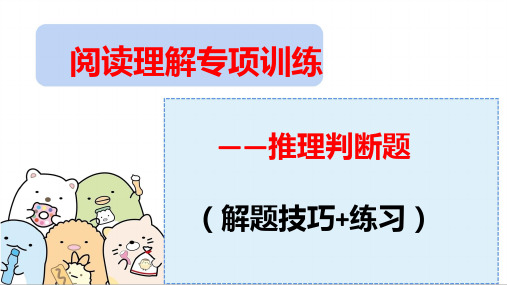
推断隐含意思
推断隐 含意思
要求 推断言外之意或弦外之音 常含infer(推断), suggest, imply
题干 常有can, could, probably, likely等
练习:名师指津P108 (四)
My mom's annual visits to my school sparked (激发) interest from other parents as well. Over the years, we had visits from parents who shared how festivals were celebrated in Germany and Italy.
than, on the contrary, on the other hand等
考点4:作出判断和推理
这类试题要求考生根据文章提供的事实和线索进行 逻辑推理,推测作者未明确提到的事实或某事件发展的 趋势。这种判断和推理的能力是阅读理解能力的重要组 成部分,因而也是阅读理解部分重点考查的能力之一。 每年每套题通常会有 4~6 题。
练习:名师指津P108 (四) Every September, I hated presenting the note my parents had expertly made to a teacher I was just getting to know. The note explained that I would be absent during the Jewish High Holidays of Rosh Hashanah and Yom Kippur. I fretted that my teachers would label me the “Jewish kid”.
七年级英语阅读理解推理判断题60题
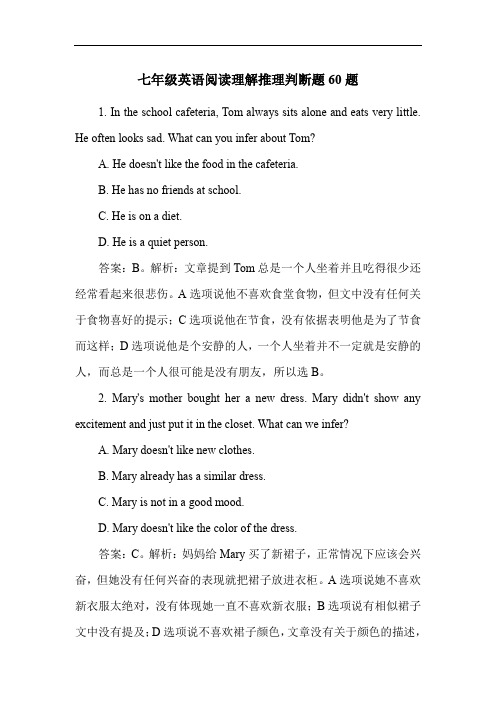
七年级英语阅读理解推理判断题60题1. In the school cafeteria, Tom always sits alone and eats very little. He often looks sad. What can you infer about Tom?A. He doesn't like the food in the cafeteria.B. He has no friends at school.C. He is on a diet.D. He is a quiet person.答案:B。
解析:文章提到Tom总是一个人坐着并且吃得很少还经常看起来很悲伤。
A选项说他不喜欢食堂食物,但文中没有任何关于食物喜好的提示;C选项说他在节食,没有依据表明他是为了节食而这样;D选项说他是个安静的人,一个人坐着并不一定就是安静的人,而总是一个人很可能是没有朋友,所以选B。
2. Mary's mother bought her a new dress. Mary didn't show any excitement and just put it in the closet. What can we infer?A. Mary doesn't like new clothes.B. Mary already has a similar dress.C. Mary is not in a good mood.D. Mary doesn't like the color of the dress.答案:C。
解析:妈妈给Mary买了新裙子,正常情况下应该会兴奋,但她没有任何兴奋的表现就把裙子放进衣柜。
A选项说她不喜欢新衣服太绝对,没有体现她一直不喜欢新衣服;B选项说有相似裙子文中没有提及;D选项说不喜欢裙子颜色,文章没有关于颜色的描述,很可能是她当时心情不好,所以选C。
阅读理解中的推理判断与推断能力(练习题及)
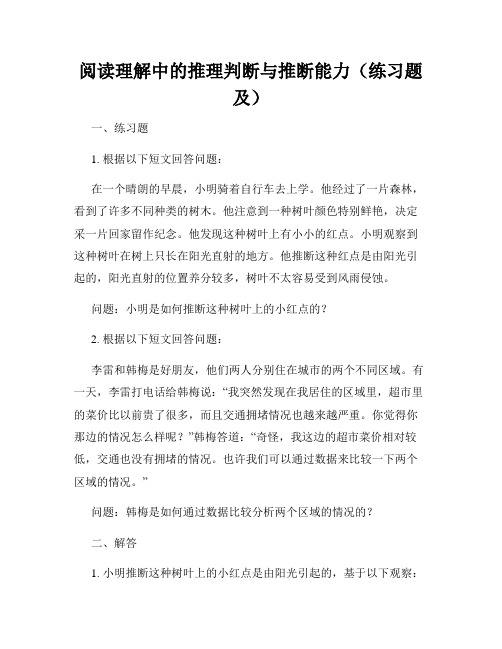
阅读理解中的推理判断与推断能力(练习题及)一、练习题1. 根据以下短文回答问题:在一个晴朗的早晨,小明骑着自行车去上学。
他经过了一片森林,看到了许多不同种类的树木。
他注意到一种树叶颜色特别鲜艳,决定采一片回家留作纪念。
他发现这种树叶上有小小的红点。
小明观察到这种树叶在树上只长在阳光直射的地方。
他推断这种红点是由阳光引起的,阳光直射的位置养分较多,树叶不太容易受到风雨侵蚀。
问题:小明是如何推断这种树叶上的小红点的?2. 根据以下短文回答问题:李雷和韩梅是好朋友,他们两人分别住在城市的两个不同区域。
有一天,李雷打电话给韩梅说:“我突然发现在我居住的区域里,超市里的菜价比以前贵了很多,而且交通拥堵情况也越来越严重。
你觉得你那边的情况怎么样呢?”韩梅答道:“奇怪,我这边的超市菜价相对较低,交通也没有拥堵的情况。
也许我们可以通过数据来比较一下两个区域的情况。
”问题:韩梅是如何通过数据比较分析两个区域的情况的?二、解答1. 小明推断这种树叶上的小红点是由阳光引起的,基于以下观察:- 小红点只出现在阳光直射的位置;- 阳光直射的位置养分较多,树叶不太容易受到风雨侵蚀。
通过这些观察,小明可以推断阳光引起了这种树叶上的小红点。
2. 韩梅通过数据比较分析两个区域的情况,可能采取以下步骤:- 收集李雷所在区域的超市菜价和交通拥堵情况的数据;- 收集自己所在区域的超市菜价和交通情况的数据;- 对两个区域的数据进行比较分析,包括计算平均菜价、比较交通拥堵指数等;- 根据比较分析的结果得出结论,判断两个区域的情况异同。
通过以上数据比较分析,韩梅可以了解两个区域的超市菜价和交通状况是否存在差异,并得出结论。
专题8.阅读理解---推理判断题(解析版)--(2020-2023)三年新高考英语真题+两年模拟题分
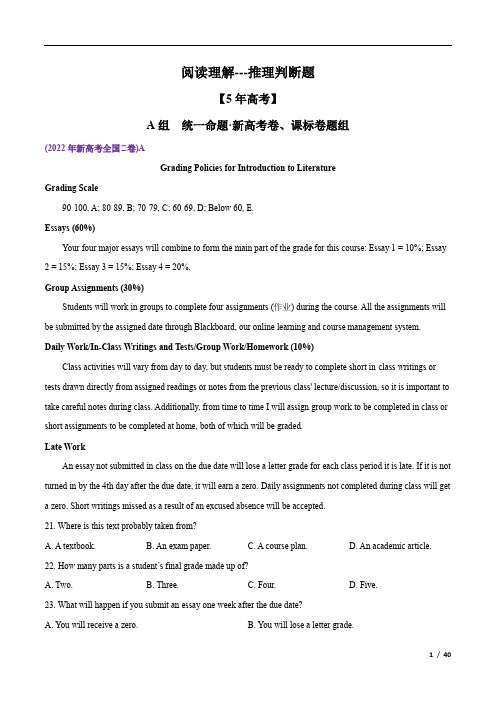
Your four major essays will combine to form the main part of the grade for this course: Essay 1 = 10%; Essay 2 = 15%; Essay 3 = 15%; Essay 4 = 20%.
(2022年新高考全国Ⅱ卷)D
As we age, even if we’re healthy, the heart just isn’t as efficient in processing oxygen as it used to be. In most people the first signs show up in their 50s or early 60s. And among people who don’t exercise, the changes can start even sooner.
Late Work
An essay not submitted in class on the due date will lose a letter grade for each class period it is late. If it is not turned in by the 4th day after the due date, it will earn a zero. Daily assignments not completed during class will get a zero. Short writings missed as a result of an excused absence will be accepted.
C. You will be given a test.D. You will have to rewrite it.
专题08 阅读理解判断推理题-周练(原卷版)
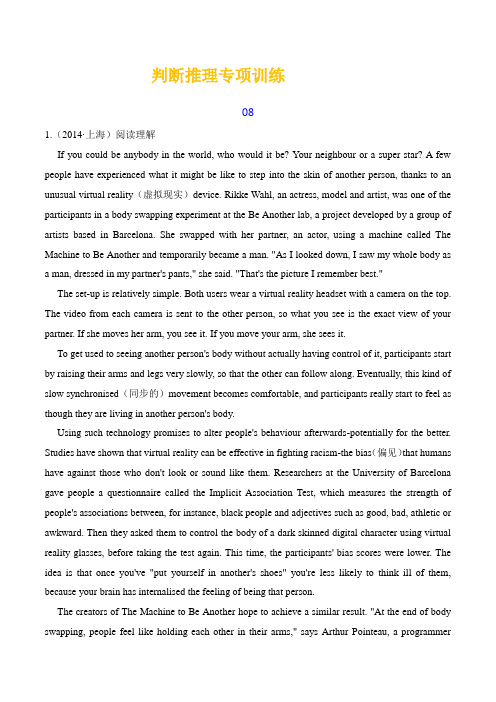
判断推理专项训练081.(2014·上海)阅读理解If you could be anybody in the world, who would it be? Your neighbour or a super star? A few people have experienced what it might be like to step into the skin of another person, thanks to an unusual virtual reality(虚拟现实)device. Rikke Wahl, an actress, model and artist, was one of the participants in a body swapping experiment at the Be Another lab, a project developed by a group of artists based in Barcelona. She swapped with her partner, an actor, using a machine called The Machine to Be Another and temporarily became a man. "As I looked down, I saw my whole body as a man, dressed in my partner's pants," she said. "That's the picture I remember best."The set-up is relatively simple. Both users wear a virtual reality headset with a camera on the top. The video from each camera is sent to the other person, so what you see is the exact view of your partner. If she moves her arm, you see it. If you move your arm, she sees it.To get used to seeing another person's body without actually having control of it, participants start by raising their arms and legs very slowly, so that the other can follow along. Eventually, this kind of slow synchronised(同步的)movement becomes comfortable, and participants really start to feel as though they are living in another person's body.Using such technology promises to alter people's behaviour afterwards-potentially for the better. Studies have shown that virtual reality can be effective in fighting racism-the bias(偏见)that humans have against those who don't look or sound like them. Researchers at the University of Barcelona gave people a questionnaire called the Implicit Association Test, which measures the strength of people's associations between, for instance, black people and adjectives such as good, bad, athletic or awkward. Then they asked them to control the body of a dark skinned digital character using virtual reality glasses, before taking the test again. This time, the participants' bias scores were lower. The idea is that once you've "put yourself in another's shoes" you're less likely to think ill of them, because your brain has internalised the feeling of being that person.The creators of The Machine to Be Another hope to achieve a similar result. "At the end of body swapping, people feel like holding each other in their arms," says Arthur Pointeau, a programmerwith the project. "It's a really nice way to have this kind of experience. I would really, really recommend it to everyone."(2)We can infer from the experiment at the Be Another lab that______.A.our feelings are related to our bodily experienceB.we can learn to take control of other people's bodiesC.participants will live more passionately after the experimentD.The Machine to Be Another can help people change their sexes(4)It can be concluded from the passage that______.A.technology helps people realize their dreamsB.our biases could be eliminated through experimentsC.virtual reality helps promote understanding among peopleD.our points of view about others need changing constantly2.One day when I was 12, my mother gave me an order: I was to walk to the public library, and borrow at least one book for the summer. This was one more weapon for her to defeat my strange problem — inability to read.In the library, I found my way into the “Children’s Room.” I sat down on the floor and pulled a few books off the shelf at random. The cover of a book caught my eye. It presented a picture of a beagle. I had recently had a beagle, the first and only animal companion I ever had as a child. He was my secret sharer, but one morning, he was gone, given away to someone who had the space and the money to care for him. I never forgot my beagle.There on the book's cover was a beagle which looked identical(相同的)to my dog. I ran my fingers over the picture of the dog on the cover. My eyes ran across the title, Amos, the Beagle with a Plan. Unknowingly, I had read the title. Without opening the book, I borrowed it from the library for the summer.Under the shade of a bush, I started to read about Amos. I read very, very slowly with difficulty. Though pages were turned slowly, I got the main idea of the story about a dog who, like mine, had been separated from his family and who finally found his way back home. That dog was my dog, and I was the little boy in the book. At the end of the story, my mind continued the final scene of reunion,on and on, until my own lost dog and I were, in my mind, running together.My mother's call returned me to the real world. I suddenly realized something: I had read a book, and I had loved reading that book. Everyone knew I could not read. But I had read it. Books could be incredibly wonderful and I was going to read them.I never told my mother abo ut my “miraculous” (奇迹般地) experience that summer, but she saw a slow but remarkable improvement in my classroom performance during the next year. And years later, she was proud that her son had read thousands of books, was awarded a PhD in literature, and authored his own books, articles, poetry and fiction. The power of the words has held.(3)Why could the author manage to read the book through?A.He was forced by his mother to read it.B. He identified with the story in the book.C. The book told the story of his pet dog.D.The happy ending of the story attracted him.(4)What can be inferred from the last paragraph?A.The author has become a successful writer.B.The author’s mother read the same book.C.The author’s mother rewarded him with books.D.The author has had happy summers ever since.3.阅读理解Science has a lot of uses. It can uncover laws of nature, cure diseases, make bombs, and help bridges to stand up. Indeed science is so good at what it does that there’s always a temptation(诱惑) to drag it into problems where it may not be helpful. David Brooks, author of The Social Animal: The Hidden Sources of Love, Character,and Achievement, appears to be the latest in a long line of writers who have failed to resist the temptation.Brooks gained fame for several books. His latest book The Social Animal, however, is more ambitious and serious than his earlier books. It is an attempt to deal with a set of weighty topics. The book focuses on big questions: What has science revealed about human nature? What are the sources of character? And why are some people happy and successful while others aren't?To answer these questions, Brooks surveys a wide range of disciplines(学科). Consideringthis, you might expect the book to be a dry recitation of facts. But Brooks has structured his book in an unorthodox(非常规的), and perhaps unfortunate, way. Instead of introducing scientific theories, he tells a story, within which he tries to make his points, perhaps in order to keep the reader's attention.So as Harold and Erica, the hero and heroine in his story, live through childhood, we hear about the science of child development and as they begin to date we hear about the theory of sexual attraction. Brooks carries this through to the death of one of his characters.On the whole, Brooks’s story is acceptable if uninspired. As one would expect, his writing is mostly clear and, to be fair, some chapters stand out above the rest. I enjoyed, for instance, the chapter in which Harold discovers how to think on his own. While Harold and Erica are certainly not strong or memorable characters, the more serious problems with The Social Animal lie elsewhere. These problems partly involve Brooks's attempt to translate his tale into science.(2)According to the author, which of the following could be a strength of the book?A.Its strong basis.B.Its convincing points.C. Its clear writing.D.Its memorable characters.4.At thirteen, I was diagnosed(诊所)with kind of attention disorder. It made school difficult for me. When everyone else in the class was focusing on tasks, I could not.In my first literature class, Mrs.Smith asked us to read a story and then write on it, all within 45 minutes. I raised my hand right away and said,“Mrs. Smith, you see, the doctor said I have attention problems. I might not be able to do it.”She glanced down at me through her glasses, “you are no different from your classmates, young man.”I tried, but I didn't finish the reading when the bell rang. I had to take it home.In the quietness of my bedroom, the story suddenly all became clear to me. It was about a blind person, Louis Braille. He lived in a time when the blind couldn't get much education. But Louis didn't give up. Instead, he invented a reading system of raised dots(点), which opened up a whole new world of knowledge to the blind.Wasn't I the “blind” in my class, being made to learn like the “sighted” students? My thoughts spilled out and my pen started to dance. I completed the task within 40 minutes. Indeed, I was no different from others; Ijust needed a quieter place. If Louis could find his way out of his problems, why should I ever give up?I didn't expect anything when I handled in my paper to Mrs.Smith, so it was quite a surprise when it came back to me the next day- with an“A” on it. At the bottom of the paper were these words:“ See what you can do when you keep trying?”(2)What do we know about Louis Braille from the passage?A.He had good sightB.He made a great invention.C.He gave up readingD.He learned a lot from school(3)What was Mrs.Smith ‘s attitude to the author at the end of the story?A.AngryB.ImpatientC.SympatheticD.Encouraging。
阅读理解专项—推理判断题
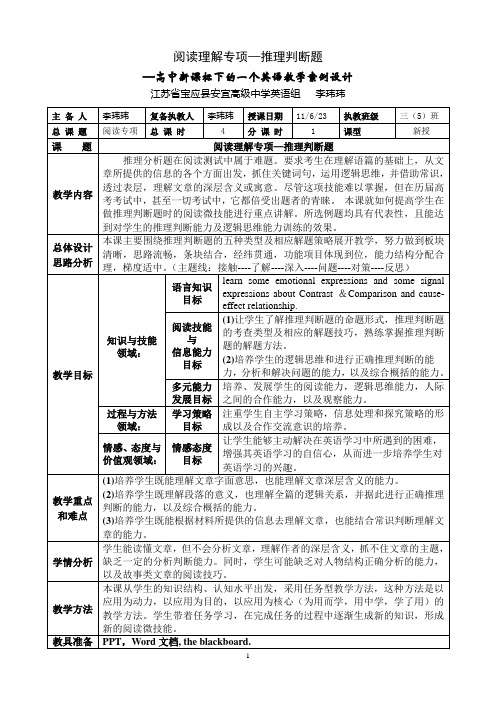
阅读理解专项—推理判断题—高中新课标下的一个英语教学案例设计江苏省宝应县安宜高级中学英语组李玮玮阅读理解专项—推理判断题【教学反思】估计问题:课时容量(加拓展部分)较大,要求内容展开速度较快,学生可能出现跟不上节奏的问题、兴趣低落等问题。
解决方案:从细节上做到每一步骤操作性很强,避免学生在某一步骤受阻。
如经典试题1可以给学生作适当分析,让他们有规律可循。
成功之处:1、该课流程清晰有条理,且能突出重点,注重对学生阅读理解的微技能训练。
2、该课当中采用了较多的教学方法和手段,成功地调动了学生的学习兴趣,并能引导学生进行扎实有效的思维训练,培养了学生的逻辑分析能力和综合概括能力,随堂检测效果明显。
3、多媒体教学直观地呈现了该课教学流程,节省了大量的时间,提高了课堂的教学效率。
4、师生互动频繁,充分锻炼和提高了学生的英语语言表达能力。
5、同时该课也采用了“分层教学”和“任务型教学”的新理念,教学中分别为不同层面的学生设计了学习任务,并且让学生走上讲台自主发挥,锻炼了学生的自主学习能力,让他们能够充分享受到英语学习的乐趣。
6、小组活动,严格遵循本课“为用而学”的设计思路,充分培养了学生的团队合作意识和竞争意识。
7、运用图式理论进行阅读教学,使文章结构化,把其主要内容分层次结合到学生头脑中贮存信息的网络中,这样不仅可帮助学生更好地理解课文内容,更重要的是帮助他们打开阅读思路,掌握阅读技巧,培养阅读能力,提高阅读水平。
不足之处:1、该课作为公开课,同时又是借班上课,因此学生的课堂纪律要好于往常,但也因此带来了一个严重的问题,上课前几分钟,课堂气氛相对紧张,很多学生不敢开口,同时在一定程度上影响了自身的教学情绪,譬如课堂声音较小。
2、由于推理判断题的难度较大以及课堂容量等因素,因此设计该课时更加关注的是如何向学生展示一些解题的实用技能,培养学生的自主学习能力,因此忽视了对学生交流合作意识的培养。
LeeWeiwei2011-6-23。
高三英语阅读理解专题— 推理判断题课件(共29张)
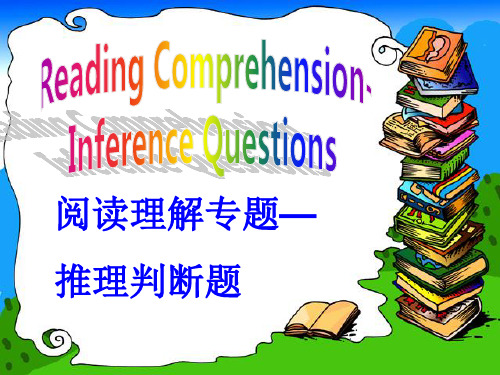
• A. A book review. B. A news report.
• C. A magazine. D. A martial arts novel.
技巧1:从文章体裁或出处推断写作目的 1. Question forms: (1) 考查整篇文章的写作目的 A. The writer’s purpose of writing this passage is to _. B. In writing the passage, the author intends to _____.
2.考点解读
专题一 阅读理解
3.专题整合&4. 考题讲练
推理判断是指在理解原文字面意义的基础上,通过对语 篇逻辑关系的分析和细节的暗示,做出一定的判断和推理, 从而得出文章的深层意义及隐含意义的过程。常出现的推理 有逻辑推理、知识推理等。这类考题中常出现的词有 infer, imply, suggest, indicate, conclude, learn from, probably, most likely, can, could, might, may 等。下面结合试题对不同类型的 推理判断题进行讲解。
•
holmwood, who has also translated works by other
contemporary chinese authors, said she became very involved
in the details and admired jin yong’s brilliant writing. as a fan of
2. Probable answers:
- 1、下载文档前请自行甄别文档内容的完整性,平台不提供额外的编辑、内容补充、找答案等附加服务。
- 2、"仅部分预览"的文档,不可在线预览部分如存在完整性等问题,可反馈申请退款(可完整预览的文档不适用该条件!)。
- 3、如文档侵犯您的权益,请联系客服反馈,我们会尽快为您处理(人工客服工作时间:9:00-18:30)。
理
3.推断写作目的
判
4.推断文章出处
断
题
5.推断上下文内容
1. Question forms:
It can be inferred from the text that .
From the text we know that …is most likely .
When the writer talks about …, what the writer
A. Crying is the best way to get help from others.
B. Fighting back tears may cause some health problems.
really means is .
The writer suggests that .
The story implies that .
We can infer[conclude]
from the passage
that .
2这.技类巧题干点中拨通常含有infer, suggest, imply,
1c)o.n全c面lud分e等析标2)志.忠性实词原语文。3).不要选择表层信息
说明文中作者的态度: objective 客观的
neutral ( 中立的);
在议论文中,有: (1)positive (积极的)
(2)negative 消极的
(3)neutral (中立的) (4)approval (赞成的)
(5) disapproval
不赞成的
(6) indifferent
漠不关心的
? A. live outside the United Stated and Canada
? B. are well adapted to swampy terrain
? C. existed before the Ice Age
? D. have been killed or have died out
3.Practice:
(passage1)
Did you ever hear a strange sound coming from the wall? Did it sound like a clock? If so, it may have been made by a beetle. Long ago people thought the ticking meant that someone was about to die. Thus the beetle is called he deathwatch beetle. (1分钟) ● The sound of this beetle ________. A. pleased people. B. surprised people. C. frightened people. D. excited people.
Studies have shown that too much control of emotions
can lead to high blood pressure, heart problems and
some other illnesses. If you have a health problem,
2.技巧点拨 注意作者表达感情色彩的形容词、副词、 动词及所举的例子,才能推断出作者的 弦外之音。
Passage 5 .(江西卷) Just as crying can be healthy, not
crying—holding back tears of anger, pain or
suffering —can be bad for physical( 身体的) health.
doctors will certainly not ask you to cry. But when you
feel like crying, don't fight it. It's a natural— and
healthy—emotional response( 反应).
(2分钟)
●According to the author, which of the following statements is true?
(7)sarcastic (讽刺的) (8)critical (批评的)
(9)optimistic 乐观的 (10)pessimistic 悲观的
1. Question forms: The writer's attitude toward… is______. The writer thought that______. According to the author ______.
P3 Several different bison species have lived on the North American continent since the Ice Age; today only two exist. The wood bison is the larger of the two, and is now found mostly in western Canada. Better known in the United States is the Plains bison, or buffalo. At one time, herds of these animals could be sighed almost everywhere from the Appalachian Mountains in the East to the Rocky Mountains in the West. ● The author implies that several types of bison______.
welcome
阅读理解专题--推理判断题
07、08广东高考阅读理解推理判断题:
2007 年 2051题, 53题, 54 题, 55 题
44题, 45题, 47 题, 48题, 50题, 54 题, 55 题
阅
1. 推断隐含意义
读
2.推断作者观点或态度
推
